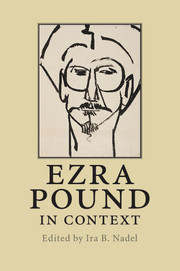Book contents
- Frontmatter
- Contents
- Notes on contributors
- Acknowledgements
- Chronology
- List of abbreviations and note on references to The Cantos
- Introduction
- Part I Biography and works
- Part II Historical and cultural context
- 16 The classics
- 17 Provençal and the troubadours
- 18 Dante and early Italian poetry
- 19 America
- 20 Venice
- 21 London
- 22 Paris
- 23 Rapallo and Rome
- 24 Pisa
- 25 Imagism
- 26 Vorticism
- 27 Music
- 28 Visual arts
- 29 Confucius
- 30 The Orient
- 31 Little magazines
- 32 Publishing and publishers
- 33 Modernism
- 34 Fascism
- 35 Anti-Semitism
- 36 Gender and sexuality
- 37 Race
- 38 Travel
- Part III Critical reception
- Further reading
- Index
22 - Paris
Published online by Cambridge University Press: 05 July 2014
- Frontmatter
- Contents
- Notes on contributors
- Acknowledgements
- Chronology
- List of abbreviations and note on references to The Cantos
- Introduction
- Part I Biography and works
- Part II Historical and cultural context
- 16 The classics
- 17 Provençal and the troubadours
- 18 Dante and early Italian poetry
- 19 America
- 20 Venice
- 21 London
- 22 Paris
- 23 Rapallo and Rome
- 24 Pisa
- 25 Imagism
- 26 Vorticism
- 27 Music
- 28 Visual arts
- 29 Confucius
- 30 The Orient
- 31 Little magazines
- 32 Publishing and publishers
- 33 Modernism
- 34 Fascism
- 35 Anti-Semitism
- 36 Gender and sexuality
- 37 Race
- 38 Travel
- Part III Critical reception
- Further reading
- Index
Summary
WHY PARIS?
Along a margin in Francis Picabia's July 10, 1921 issue of the Dadaist journal 391 rambles Ezra Pound's joking epigram: “Paris quoi? Paris contre le monde?? Quoi? Et je suis ici depuis trois mois sans trouver une maîtresse convenable.” Pound and his wife Dorothy settled in Paris in April of 1921 and stayed until late 1924, when they moved to Italy, a sojourn that would prove more fruitful than its brevity might suggest. During this short time, Pound met and worked with many of the artists he already admired; composed an opera; published a book on music; arranged housing for James Joyce and his family and introduced Joyce to Sylvia Beach, who would publish Ulysses; met the violinist Olga Rudge, who remained his lover and helpmate to the end of his life; continued to contribute essays, poems, translations, and criticism to periodicals; and most important, wrote several new cantos for his long poem and substantially revised the seven Cantos he had begun in London, altering his approach to the entire work. By the time Pound left Paris, exhausted, over-stimulated, distracted, and unwell, he had prepared sixteen cantos for publication in a luxury edition by William Bird's small publishing house, Three Mountains Press. This edition, A Draft of xvi Cantos, which did not appear until 1925, was the first publication of The Cantos in book form.
It was in Paris that Pound made the most radical innovations in The Cantos, a work still in its infancy when he left London. The importance of these changes cannot be overstated, and may in large measure be attributed to his encounter with the French avant-garde Dadaists, especially Picabia and Cocteau. Pound tended to become attached to movements that were defiantly – and sometimes dangerously – new: in London he quickly moved from imagism, a movement he had devised, to vorticism, then in Paris to Dada, and finally, through economics and politics, to Italian fascism. Poetically, the formal rebellion that reached its high point in London with Blast found an even more important and far-reaching new expression during Pound's brief but important engagement with the Dadaists in Paris.
- Type
- Chapter
- Information
- Ezra Pound in Context , pp. 241 - 249Publisher: Cambridge University PressPrint publication year: 2010



